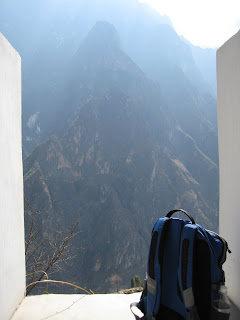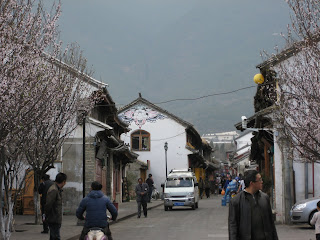Chunjie, aka Chinese New Years, aka Lunar New Year, aka Post-Apocalyptic China for Two Weeks, is a festival. A huge, national, fifteen day long festival.


Those, my friends, are fireworks. For those of you who read my Barcelona blog (hah, right, like I have a readership), you remember that in Barcelona, setting a firework off next to a building was not uncommon during festivals like San Juan. China has a similar view, except "uncommon" is not the right adjective. China sets off fireworks next to buildings with no compunction whatsoever. That picture above is a firework going off between two highrises. No big deal. Is it safe? Uh, no. Walking around during chunjie gets exciting really quickly, since, you know, kids are exacting revenge on meddlesome neighbors by bombing their cars with firecrackers, and if you happen to be in the way of that firecracker, that sucks. Welcome to Darwinism at its finest. If you are oblivious, chunjie will eat you alive. And yet, I did survive.
I also went to a temple festival during chunjie with a couple friends from Beijing, Jordan and Bernice, awesome people (and no, I am not just saying that because Jordan is one-fourth of my readership on this blog). The festival was very interesting. Having never been to one before, I was surprised to see that they had imported snow and set up sledding areas, in addition to pony rides and food stands galore. Of course, I was basically the only laowai there. Staring from passersby definitely happened. One guy got very National Geographic with me, as in, he was in my face with a huge camera, snapping away while I failed at eating tofu. He was all but narrating, "And here we have a laowai in its natural habitat. Observe its eating habits. The laowai are not known for their mental or physical aptitude. Note how this one apparently cannot eat tofu correctly....*click* *click* *click*" Hey, I don't mind being a one-woman zoo. I really should start bringing a hat with me so people can give me money for being so entertaining, though.
During the Chinese New Years itself, I went to a homestay family. At dinner, there were four different languages being spoken: Spanish, English, Russian, and of course Chinese. Yeah, we IES students are THAT multicultural, it was a pretty awesome experience. The food was excellent (lots of jiaozi!!!), and the people were wonderful.
Overall, I like chunjie. It's got its downsides, but I like it. It makes me feel alive, in every possible way. Including ways that involve running for your life so you don't have an obituary that reads "Emily was a promising girl, who just happened to be obliviously walking by a firework when...."














